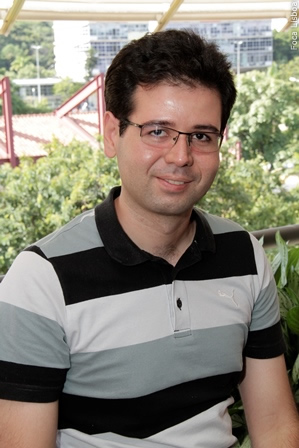Daniel Fernandes Macedo

CNPq research fellow: C
Research areas: Degrees:
PhD, Université Pierre et Marie Curie, Paris Sorbonne, 2009
Phone: 7584
damacedo@dcc.ufmg.br
 Home page
Home page
 Lattes
Lattes
 Google scholar
Google scholar Information extracted from Lattes platform
Last update: 2023/10/11ORCID: https://orcid.org/0000-0001-6668-4175
Current projects
| 2022 a Atual | Gerenciamento de redes centrado na experiência do usuário - GEREX Integrantes: Daniel Fernandes Macedo (coordenador), Álvaro Rodrigues Pereira Junior, Gilson Miranda Júnior, Marcos Magno de Carvalho, Daniel Henriques Cézar Miranda Soares. |
| 2022 a Atual | PPAM - Padrões de projeto para gerenciamento de redes baseado em aprendizado de máquina Integrantes: Daniel Fernandes Macedo (coordenador). |
| 2021 a Atual | Programa de Capacidades Analíticas Ano II-III do MPMG O projeto Programa Capacidades Analíticas do MPMG em cooperação com o DCC/UFMG visa construir e disponibilizar ferramentas digitais para agilizar a capacidade de análise e cruzamento de dados nas investigações do MPMG, para isso pesquisando, desenvolvendo e apropriando de modelos do estado da arte, técnicas e tecnologias para processamento massivo de dados, em particular análises e modelagens descritivas, preditivas e prescritivas. É um projeto de 24 meses.. Integrantes: Wagner Meira Junior (coordenador), Daniel Fernandes Macedo, Nogueira, José M., Dorgival Olavo Guedes Neto. |
| 2021 a Atual | PORVIR-5G - programabilidade, orquestração e virtualização de redes em 5g The PORVIR-5G project is a project in cooperation between UFMG, UFES, UFRGS, UNISINOS and UNICAMP, which will investigate the future of the Internet in view of the new demands of 5G networks. The project will develop and demonstrate a communication network with its programmable fronthaul and backhaul, integrating wireless networks with optical network solutions, packet switched networks and cloud computing. The key technologies of the PORVIR-5G project are: (i) slicing of optical, wireless and packet networks, controlled by (ii) deep programmability interfaces, through which devices are configured by network functions to provide the necessary performance for future Internet applications, which allows for (iii) end-to-end and multi-layer orchestration, considering the quality of experience of applications running on the network. The project will validate and demonstrate the programmability and virtualization proposals in three demos, each supporting the key performance demands of 5G networks: (i) an Internet of Things demonstration focusing on massive communication between devices (massive machine-type communication); (ii) a demonstration of smart cities that demand reliable low-latency flows; and (iii) a demonstration of high-speed video transmission that demonstrates next generation broadband networks. Integrantes: José Marcos S Nogueira (coordenador), Daniel Fernandes Macedo, MOTA, VINICIUS F. S., Magnos Martinello, Moisés R. N. Ribeiro, WICKBOLDT, JULIANO, BOTH, CRISTIANO B., Christian Esteve Rotherberg. |
| 2021 a Atual | SFI2 - Slicing future internet infrastructures The technological evolution centered on the concepts of Software Defined Networks (SDN), Network Functions Virtualization (NFV), Cloud Computing, Internet of Things (IoT) and, more recently, on the fifth generation of mobile telecommunications networks, known as 5G, has caused great impact on the Internet. This impact comes not only from the creation of new technologies, communication protocols, security solutions, energy efficiency mechanisms and others, but also from the need to jointly operate this plethora of innovations with each other and with the legacy of the Internet. As a result, several experimentation environments with different scopes have emerged in Brazil, targeting at the research of different subsets of technologies, among them: FIBRE, experimentation of alternative architectures to the current Internet; FUTEBOL, experimentation in telecommunications networks involving optical and wireless communications; CloudNEXT, experimentation on cloud computing and bare-metal provisioning; FIWARE, future Internet-Based applications based on Internet of Things (IoT), Big Data and Cloud Computing; 5GINFIRE, experimentation in 5G networks, based on NFV and cloud usage; and finally NECOS, focused on the creation of slices that encompass different clouds with distributed resources. The main objective of this project is to provide a solution for the provision of advanced network scenarios and allocation of computational resources by slicing these multi-domain experimentation infrastructures, in the simplified creation of complex networks with minimum configuration effort based on the intelligent orchestration of this multi-domain slicing, offering Slice-as-a Service (SlaaS) for future Internet developers. Integrantes: Daniel Fernandes Macedo (coordenador), Tereza Cristina Melo de Brito Carvalho. |
Current applied research projects
| 2020 a Atual | Capacidades analíticas - subprojeto segurança de sistemas Integrantes: NOGUEIRA, JOSE MARCOS (coordenador), Daniel Fernandes Macedo, Dorgival Olavo Guedes Neto. |
Recent publications
Articles in journals
Container Scheduling in Co-Located Environments Using QoE Awareness2023. IEEE Transactions on Network and Service Management.
Enhancing Network Slicing Architectures with Machine Learning, Security, Sustainability and Experimental Networks Integration
2023. IEEE Access.
The Quality-Aware and Vertical-Tailored Management of Wireless Time-Sensitive Networks
2022. IEEE Internet of Things Magazine.
Joint Content-Mobility Priority Modeling for Cached Content Selection in D2D Networks
2021. Journal of Network and Systems Management.
OpenFlow data planes performance evaluation
2021. PERFORMANCE EVALUATION.
Slicing Wi-Fi links based on QoE video streaming fairness
2021. International Journal of Network Management (Online).
Estimating Video on Demand QoE from Network QoS through ICMP Probes
2021. IEEE Transactions on Network and Service Management.
 Programmable Networks ? From Software Defined Radio to Software Defined Networking
Programmable Networks ? From Software Defined Radio to Software Defined Networking2015. IEEE Communications Surveys and Tutorials.
 Vehicular networks using the IEEE 802.11p standard: An experimental analysis
Vehicular networks using the IEEE 802.11p standard: An experimental analysis2014. Vehicular Communications.
 Enhancing peer-to-peer content discovery techniques over mobile ad hoc networks
Enhancing peer-to-peer content discovery techniques over mobile ad hoc networks2009. Computer Communications.
 Transmission Power Control Techniques for Wireless Sensor Networks
Transmission Power Control Techniques for Wireless Sensor Networks2007. Computer Networks.
Papers in conferences
A Stacking Learning-Based QoE Model for Cloud Gaming2023. NOMS 20232023 IEEE/IFIP Network Operations and Management Symposium.
Transfer Learning-Based QoE Estimation For Different Cloud Gaming Contexts
2023. 2023 IEEE 9th International Conference on Network Softwarization (NetSoft).
Improved Video QoE in Wireless Networks using Deep Reinforcement Learning
2023. 19th International Conference on Network and Service Management (CNSM).
Soft-W-TSN: Extending Time-Sensitive Networking Capabilities to Wi-Fi using Virtualized Elements
2023. 2023 IEEE Conference on Network Function Virtualization and Software Defined Networks (NFV-SDN).
Data consumption and user experience in video lecture sessions via Mobile Telephony Network
2023. IEEE Latin-American Conference on Communications (LATINCOM).
Comparative Analysis of Unsupervised Machine Learning Algorithms for Anomaly Detection in Network Data
2023. IEEE Latin-American Conference on Communications (LATINCOM).
Machine Learning-based End-to-End QoE Monitoring Using Active Network Probing
2022. 2022 25th Conference on Innovation in Clouds, Internet and Networks and Workshops (ICIN).
Analysis of Network Performance over Deep Reinforcement Learning Control Loops for Industry 4.0
2022. Simpósio Brasileiro de Redes de Computadores (SBRC).
Agendamento de Contêineres Ciente da QoE
2022. Concurso de Teses e Dissertações do SBRC.
Abordagem confiança zero aplicada a ambientes computacionais big data: um estudo de caso
2022. XXVII Workshop de Gerência e Operação de Redes e Serviços (WGRS).
Autoconfiguração de rotas em redes ad-hoc de VANTs
2022. XXVII Workshop de Gerência e Operação de Redes e Serviços (WGRS).
QoE-Aware Container Scheduler for Co-Located Cloud Environments
2021. IEEE/IFIP International Symposium on Integrated Management.
Zero Trust Access Control with Context-Aware and Behavior-Based Continuous Authentication for Smart Homes
2021. XXI Simpósio Brasileiro de Segurança da Informação e de Sistemas Computacionais (SBSEG).
MLOOF: Multi-level online offload framework for IoT devices and smartphones
2021. IEEE Latin-American Conference on Communications.
 Ethanol: Software Defined Networking for 802.11 Wireless Networks
Ethanol: Software Defined Networking for 802.11 Wireless Networks2015. 14th IFIP/IEEE International Symposium on Integrated Network Management (IM).
Extended abstracts in conferences
Real-Time QoE Estimation for DASH Video Using Active Network Probing2022. 2022 25th Conference on Innovation in Clouds, Internet and Networks and Workshops (ICIN).
Evaluating Time-Sensitive Networking Features on Open Testbeds
2022. IEEE INFOCOM 2022 IEEE Conference on Computer Communications Workshops (INFOCOM WKSHPS).
R2I - Redes Reconfiguráveis Inteligentes
2013. III Workshop em Sistemas Distribuídos Autônomos (WoSiDA).
(CIA)2-ITS: Interconnecting Mobile and Ubiquitous Devices for Intelligent Transportation Systems
2012. IEEE Pervasive Computing and Communication (PerCom).
Gerência Autonômica de Redes DTN
2011. I Workshop on Autonomic Distributed Systems (WoSIDA).
Abstracts in conferences
Time-Sensitive Networking Experimentation on Open Testbeds2022. IEEE INFOCOM 2022 IEEE Conference on Computer Communications Workshops (INFOCOM WKSHPS).
A QoE Inference Method for DASH Video Using ICMP Probing
2020. 2020 16th International Conference on Network and Service Management (CNSM).
Fostering a multidisciplinary innovation environment at UFMG
2020. Encontro de Outono da SBF.
Comparison of data center traffic division policies using SDN
2018. NOMS 2018 2018 IEEE/IFIP Network Operations and Management Symposium.
Dynamic Bandwidth Allocation for Home and SOHO Wireless Networks
2018. 2018 IEEE Symposium on Computers and Communications (ISCC).
See all publications in Lattes
Current students
MS
Tulio Henrique dos Santos. Metodologia para ensino de empreendedorismo no ensino superior. Início: 2022. Universidade Federal de Minas Gerais (Co orientador)Álvaro Antônio Fonseca de Souza. Aprendizado supervisionado para controle em IoT. Início: 2018. Universidade Federal de Minas Gerais (Orientador principal)
PhD
Marcos Magno de Carvalho. QoE-based management of 5G networks. Início: 2023. Universidade Federal de Minas Gerais (Orientador principal)Daniel Henriques Cézas Miranda Soares. Qualidade de experiência em jogos em nuvem. Início: 2022. Universidade Federal de Minas Gerais (Orientador principal)
Gilson Miranda Júnior. QoE-Driven Wireless and Mobile Slicing. Início: 2017. Universidade Federal de Minas Gerais (Orientador principal)
See all students in Lattes
